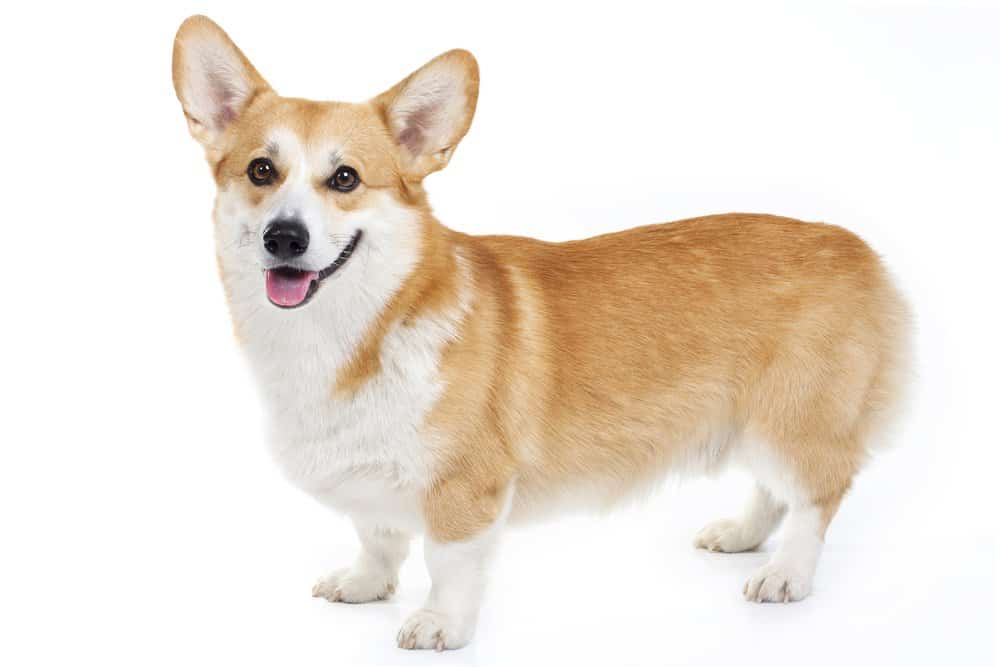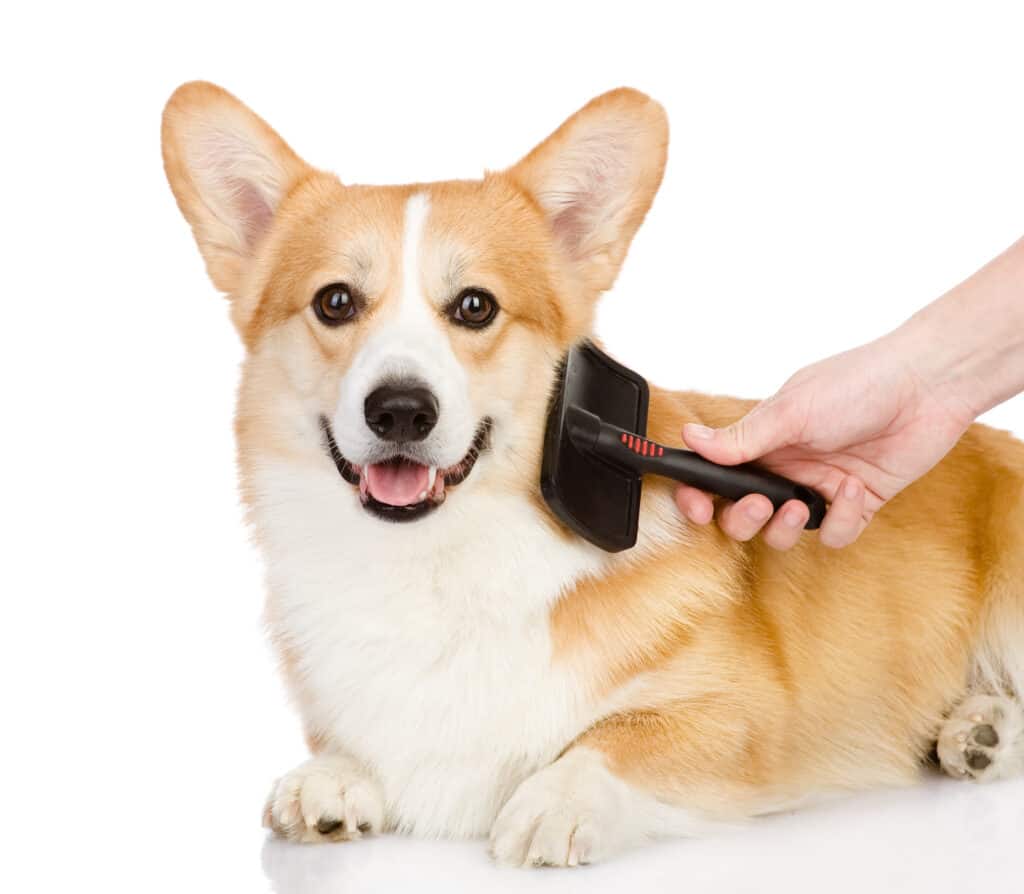Corgis are ranked the 11th most popular dog breed in the United States. They are known for their adorable appearance and quirky personality. In fact, many dog lovers have a special place in their heart for this breed.
If you are a future corgi parent, you are likely researching the breed before you adopt. And you’ll certainly want to know about shedding habits. Corgis are known to shed consistently throughout the year, but there are times in which they shed more often.
We want you to know exactly how much shedding you can expect from your corgi. So, let’s break down everything you need to know!
Understanding the Corgi’s Coat

The corgi is considered a moderate to heavy shedder.
©HelenaQueen/Shutterstock.com
When discussing the corgi’s coat, it’s important to realize that there are actually two types of corgis. While these two have slight differences in their appearance, their coat length and texture are almost identical. For this reason, we will be referring to the corgi breeds as one in relation to their shedding amounts.
Both the cardigan corgi and Welsh Pembroke corgi have medium length coats. However, some can be slightly longer based on their genetics. Their coats are both thick and coarse, but the fur around their face can feel slightly softer. Though the top layer of their coat will feel coarse, they have a plush undercoat that helps with temperature control. This double-coat is the reason why they not only shed year-round, but they will also shed more during certain seasons.
How Much Do Corgis Shed?
Now that you have a better understanding of the corgi coat, it’s time to discuss how much the corgi sheds. Overall, the beloved corgi is considered a moderate to heavy shedder. You can typically expect a layer of fur left behind on any surface that your corgi sleeps on. You’ll also spot the occasional fur tumbleweed rolling across your floor. Though you should not be pulling out chunks of fur when you pet your dog, the shedding amounts will be noticeable.
Do Corgis Shed More During Certain Seasons?
The corgi will shed year-round, but there are certain times of the year in which shedding will be more excessive. These high shedding periods are often referred to as “blowing their coat.” This occurs when the body is preparing for seasonal changes. A double coat protects the dog in both cold and warm weather. So, their fur will shed as they gear up for these seasons.
Most corgis will shed more in the fall in preparation for winter, and during the spring in preparation for summer. Their increased shedding will often be noticeable during these periods. But it is typically easy to keep up with if you increase brushing sessions.
Why Is My Corgi Shedding So Much?

Increase brushing sessions to combat the amount of stray fur around your home.
©Ermolaev Alexander/Shutterstock.com
If your lovable corgi is shedding more than usual, you’re probably trying to understand why. We want to help you determine the cause of your furry friend’s increased shedding. Let’s break down the most common causes of excessive shedding in corgis.
Your Corgi Is Shedding His Puppy Coat
If you are the proud parent of a corgi puppy, then you may notice a high shedding period throughout his first year. A young corgi will often have a soft puppy coat until he nears six months of age. Then his body will begin to make way for his mature, adult coat. Your once fuzzy corgi will grow a rough coat. This shedding process usually occurs between six to 12 months of age.
Your Corgi Is Blowing Her Coat
As we mentioned above, due to the corgi’s double coat, you will notice increased shedding when she blows her coat. This typically occurs during the spring and fall, as this allows her body to prepare for the upcoming weather change. The increased shedding often lasts for about a month. We suggest increasing brushing sessions to combat the amount of stray fur around your home.
Your Corgi Is Experiencing Hormonal Changes
If you have a female corgi that has not been spayed, then you may notice increased shedding when she is in heat. This same fur loss can occur soon after a female dog gives birth as well. These fur changes are directly tied to hormonal shifts. As long as you are not seeing skin irritation or patches of fur loss, then this is completely normal.
Your Corgi Has Ectoparasites
If your shedding corgi is also experiencing excessive itching, then he could be battling a case of ectoparasites. The term “ectoparasite” refers to any critter that lives on a dog’s skin, so this includes fleas and skin mites. These tiny invaders can cause significant skin irritation, and this can often lead to excessive shedding and fur loss.
Your corgi may have ectoparasites if he is excessively scratching or biting at his skin. Additionally, skin redness, fur loss, and skin infections are signs of ectoparasites. You should also be on the lookout for any tiny bugs or evidence of flea dirt on your pup. These is the most obvious signs of an unwelcomed skin invader. If you think your little one could have fleas, then we suggest reaching out to your vet for guidance.
Your Corgi Has Skin Allergies
Unfortunately for our treasured corgi friends, they are highly prone to developing skin allergies. A corgi can be allergic to virtually anything in the world around them, ranging from pollen to any fragrances in your home. If this is the case for your corgi, then you may see excessive shedding as a result of her skin irritation.
A corgi with skin allergies may also experience redness of the skin, eye irritation, patches of fur loss, skin sores, chronic skin infections, and even chronic ear infections. If you think your corgis is suffering from a case of allergies, then we always suggest reaching out to your vet for treatment guidance. Many corgis will require long term allergy management that is guided by a vet.
How To Groom Your Corgi
Corgis are considered moderate to heavy shedders, so that means they will shed consistently throughout the year. Due to this, you will want to maintain a regular grooming routine to manage the amount of fur your pup will shed around your home. Let’s discuss some of our favorite corgi shedding tips to keep fur loss under control!
Brush Your Corgi at Least 3 Times Per Week
Brushing your corgi at least three times per week can help to manage the fur she loses. Not only can it make her shedding much more manageable, but it can also promote her skin and coat health moving forward. Frequent brushing can stimulate oil production, and when her skin is adequately hydrated, it can decrease her excessive shedding. Regular brushing is great for your corgi in many ways!
Use Shedding Tool During High Shedding Periods
If your corgi is in the middle of blowing his coat, you may want to brush him with a shedding tool once per week. These tools can help you combat his difficult undercoat and remove any loose fur before it hits the ground.
Final Thoughts
Establishing an effective grooming routine for your corgi will result in benefits for both you and your pup. Our corgi friends are certainly heavy shedders, but their fur loss can always be managed with a bit of grooming effort. Be sure to review the information we discussed on corgi shedding habits above, and you’ll be prepared for any shedding that comes your way!
The photo featured at the top of this post is © foxhound photos/Shutterstock.com
Ready to discover the top 10 cutest dog breeds in the entire world?
How about the fastest dogs, the largest dogs and those that are -- quite frankly -- just the kindest dogs on the planet? Each day, AZ Animals sends out lists just like this to our thousands of email subscribers. And the best part? It's FREE. Join today by entering your email below.
Thank you for reading! Have some feedback for us? Contact the AZ Animals editorial team.






